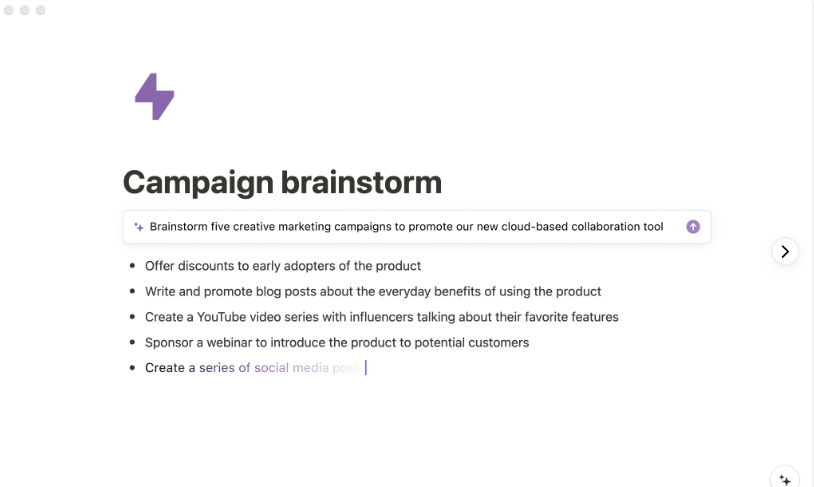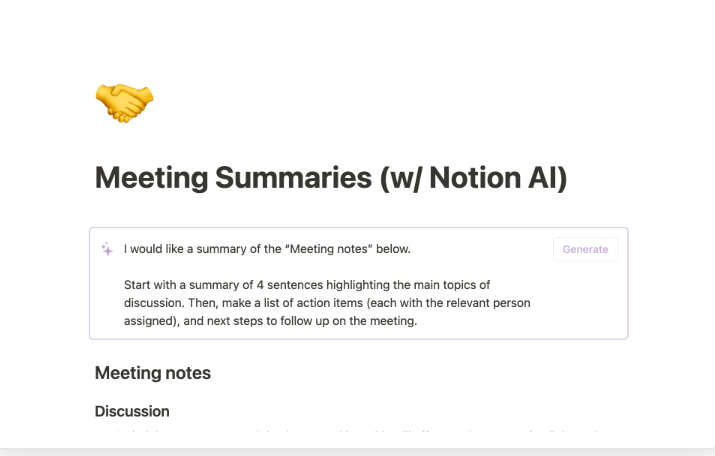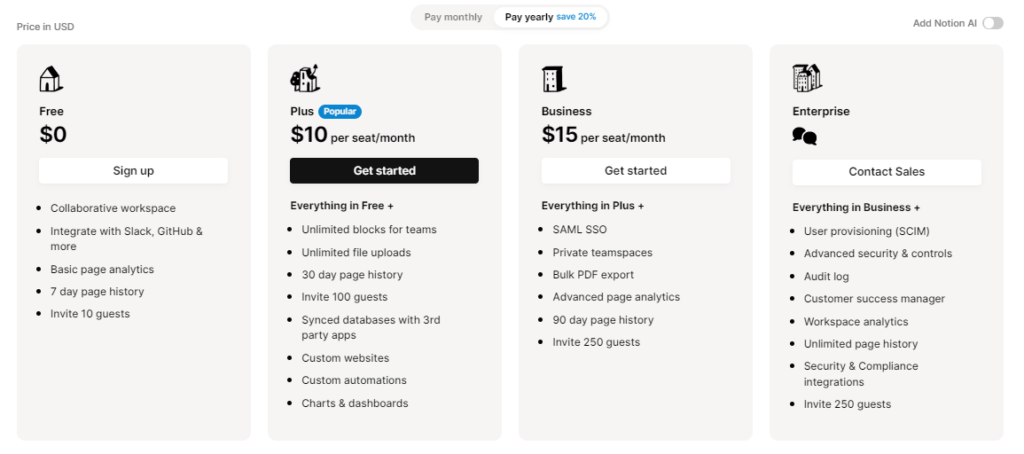Introduction
In today’s fast-paced world, staying organized and productive is essential. Whether you’re a freelancer, a team leader, or someone managing personal tasks, you need a tool that simplifies your workflow. Enter Notion—one of the most powerful tools for productivity and organization in 2024. In this review, we’ll explore Notion’s features, pricing, pros, and cons to help you decide if it’s the best tool to boost your productivity and keep your life in order.

What is Notion?
Notion is an all-in-one productivity tool that combines note-taking, task management, databases, and team collaboration. With its flexible workspace, Notion allows users to create customized layouts for different tasks, from project planning to content creation. Whether you’re using it for personal organization or to manage team projects, Notion offers a unique blend of versatility and simplicity, making it a top choice for individuals and teams alike.
Features
Notion comes packed with features that make it stand out from the crowd:
- Customizable Workspaces: Users can create personalized workspaces for different projects, making it easier to organize tasks and documents in one place.
- Database Functionality: Notion’s database feature allows users to create and manage tables, lists, calendars, and more, making project management seamless.
- Collaboration Tools: Teams can work together in real time, leave comments, and assign tasks, making Notion a great tool for collaboration.
- Templates: Notion offers a wide range of templates for different use cases, from to-do lists to project roadmaps.
- Offline Access: You can access and edit your pages even when you’re offline, ensuring continuous productivity no matter where you are.

Pros & Cons
Pros
- Highly customizable workspaces
- Combines multiple tools into one (notes, tasks, databases)
- Strong collaboration features for teams
- Affordable pricing for individuals and teams
- Available on multiple platforms (web, mobile, desktop)
Cons
- The learning curve for beginners
- Limited offline functionality on the mobile app
- Performance can lag with large databases
Pricing

Notion offers a range of pricing plans suitable for individuals, small teams, and large organizations. Here’s a breakdown of the different pricing options:
| Plan | Price | Features |
|---|---|---|
| Free | $0 | Basic features for individuals, including unlimited pages, blocks, and 7-day history. |
| Personal Pro | $4 per month | Unlimited file uploads, version history, and access to advanced page customization features. |
| Team | $8 per user/month | Collaboration features for teams, including shared workspace, unlimited team members, and admin tools. |
| Enterprise | Custom pricing | Advanced admin tools, security features, and dedicated support for large businesses. |
Notion’s Free Plan is ideal for personal use, while the Team and Enterprise plans cater to teams and larger organizations that require more advanced collaboration and admin features.
Competitor Comparison
When assessing productivity tools, it’s valuable to compare popular options like Microsoft OneNote, Evernote, and Asana to understand their distinct features and how they cater to different needs.
Microsoft OneNote is a well-regarded tool known for its robust note-taking capabilities. Users can create extensive notebooks with various sections and pages, making it ideal for organizing detailed notes. OneNote integrates seamlessly with Microsoft Office, which benefits those already using other Microsoft products. However, it lacks advanced project management and database functionalities found in some other tools, limiting its use for complex workflow management.
Evernote has long been a favorite for note-taking and organization. It excels with features such as web clipping and document scanning, and is praised for its powerful search function. Evernote is user-friendly and suitable for those who need a straightforward note-taking solution. However, its task management features are not as comprehensive as those offered by some competitors, and the limitations of its free plan might not meet the needs of users seeking more advanced features.
Asana is renowned for its project management and team collaboration tools. It offers robust features for creating tasks, setting deadlines, and tracking progress, making it a strong choice for managing team projects. Asana’s focus is primarily on task management and project workflows, and it provides a clear and organized way to handle team tasks. However, it does not offer extensive note-taking or database functionalities, which might be a drawback for users looking for an all-encompassing solution.
In comparison, the versatility of some tools in the market allows them to cater to a wide range of needs. Tools that combine note-taking, task management, and database functionalities into a single platform provide a comprehensive solution for managing both personal and team productivity. These features are particularly advantageous for users who require a flexible, customizable tool that can adapt to various workflows.
Overall, while Microsoft OneNote, Evernote, and Asana each offer valuable features, users seeking a more integrated and customizable productivity tool may find that some options stand out for their ability to combine multiple functions into one platform. Each tool has its strengths, and the best choice will depend on individual or team needs and preferences.
Conclusion
To sum up, ithas proven itself as a top productivity tool in 2024, offering an integrated solution for managing tasks, notes, and team collaboration. Its ability to bring together various productivity functions into one platform makes it a valuable choice for both individuals and teams looking to improve their organization and efficiency.
A key advantage of Notion is its high degree of customization. Users can create personalized workspaces tailored to their specific needs, whether for personal projects or team coordination. The database feature is particularly useful, allowing users to organize and display information in different formats such as tables, lists, and calendars. This flexibility helps users keep their tasks and projects well-organized.
The collaboration features are another strong point. With real-time editing, commenting, and task assignment, Notion facilitates smooth communication and project management within teams. The availability of various templates also helps users set up new projects quickly, allowing them to focus more on their work.
However, Notion does come with a few drawbacks. New users might find the extensive customization options challenging at first. Additionally, while the desktop and web versions generally perform well, the mobile app’s offline capabilities are somewhat limited. Large databases can also affect performance, potentially slowing down the user experience.
Despite these limitations, Notion’s range of features, combined with its affordability, makes it a strong contender in the productivity tool market. The free version offers substantial capabilities for individual users, while the paid plans provide additional features and enhanced team collaboration options.
For those seeking a versatile tool that integrates various productivity functions into one platform, Notion stands out as a solid option. Its blend of customization, functionality, and ease of use makes it a valuable resource for enhancing productivity and organization in 2024.

